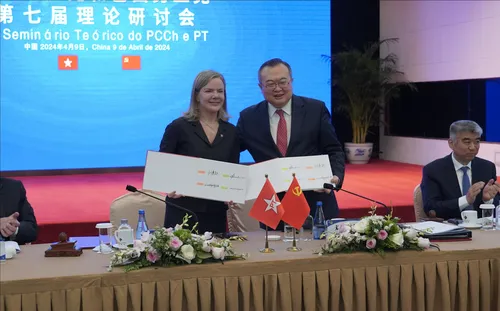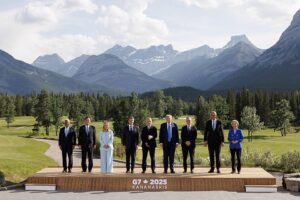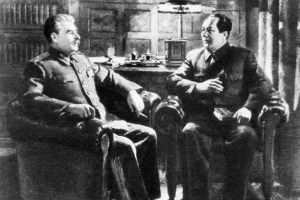
“What China is doing under the leadership of the Chinese Communist Party (CCP) in combating poverty and hunger is extraordinary. In thirty years, China has practically eliminated hunger in the country, and we are talking about a country of 1.4 billion people.”
The phrase comes from the president of the Workers’ Party (PT), Gleisi Hoffmann, in an exclusive interview with Brasil de Fato/TVT, a few hours after arriving with a delegation of 30 PT leaders in the Chinese capital, Beijing, on Tuesday (9).
“The State has influence over state-owned companies, and this makes all the difference to the planning they carry out; as well as respect for private companies. I think this is a lesson that we have to have in Brazil”, she said.
“We have respect for private companies, we encourage them, we want private investment, but the government, the Brazilian State, also has to have influence over state-owned companies, they are planning instruments and in an economy to be successful, you need to have a minimum of planning”, he continued.
“China is what it is because it is in its 15th five-year plan. We needed to have structured planning in Brazil, and for that you need to have the strength and presence of the State, including through its companies”, added the president from PT.
Four decades of relationship
The PT delegation came to China to participate in a series of activities, as part of the celebrations of 40 years of relations between the PT and CCP.
In 1984, four years after its founding, the PT sent its first delegation to China. Starting in 2008, both parties began holding seminars to debate political and economic issues and share governance experiences.

Rachel Pomar, Wladimir Pomar, Luiz Gushiken and Jacó Bittar, members of the first PT delegation to China / Perseu Abramo Foundation
The Communist Party of China maintains ties with more than 600 political parties and organizations in around 160 countries.
During the current visit, in addition to exchanges with different instances of the Chinese Communist Party, the delegation will travel to Fujian province to visit the Innovation Center of the BRICS partnership for the New Industrial Revolution, as well as an experience of poverty eradication policies. The agenda also includes visits to several companies such as Huawei and CATL, responsible for 36.8% of the global battery market for electric cars.
The first activity of the trip was the seventh Theoretical Seminar between the PT and the CPC, which opened with the reading of letters sent by the presidents of both countries. In the message read by PT president and federal deputy, Gleisi Hoffmann, Lula stated that Brazil and China face common challenges and mentioned “from the proliferation of armed conflicts to the intensification of climate change and the risks of misuse of artificial intelligence”. Lula added that “both countries prioritize the peaceful resolution of disputes.”
In a message read at the opening of the meeting, Chinese President Xi Jinping, who is also the party’s general secretary, praised the Novo PAC and the Nova Indústria Brasil program and said that his party is willing to deepen exchanges and mutual learning of experiences in state governance with the PT.
Liu Jianchao, director of the CCP’s International Department, also emphasized that new policies under the Lula government and Chinese initiatives such as the New Silk Road are “highly compatible” development strategies.
Hoffmann continued drawing a parallel between the governments of his party and the CCP in the Asian giant: “The PT has had a certain correlation with this since our first governments. We focused on combating hunger and poverty and we also managed to combat hunger and poverty in Brazil extreme poverty. Now unfortunately we are dealing with this problem again, but we are managing. But for a nation to do well, for a country to develop, it cannot have poverty, it cannot have hunger. China understands this.”
BRICS and investments
In 2020, the BRICS Partnership Center for Innovation in the New Industrial Revolution was opened in Xiamen, Fujian province. The center has several projects (ranging from areas such as software and information to the cultural industry), in which 19 companies from Russia, 13 from India, 16 from Brazil and 11 from South Africa participate. The PT delegation will visit the center.
“We are going to need a lot of partnership. Brazil needs greater technological development, we are still far behind”, assesses Gleisi.
“China has achieved surprising technological advancement in a short space of time, so we need partnership, being in the BRICS, being together with China, even with India, which also has important technological development. For us, it is fundamental.”
The European Union and the United States have increasingly accused China of “overcapacity.” The European Union has been considering imposing tariffs on Chinese electric cars under the accusation that state subsidies are distorting the market. For her part, US Treasury Secretary Janet Yellen just stopped by China announcing that she wanted to debate “unfair trade practices” and “China’s excess industrial capacity.”
Regarding the debate, Hoffmann said that in the case of Brazil, the country “wants many Chinese companies to invest in Brazil, we want other plants like Camaçari [da BYD] happen in Brazil for us, it is important especially from the perspective of the electric car, clean energy. This is fundamental. China wants to invest and we want investment.”
The “new world”
Both Hoffmann and the PT’s Secretary of International Relations, Romênio Pereira, addressed the geopolitical situation during the seminar. In her analysis, the PT president stated that the world is going through a systemic crisis and that the United States is at its epicenter. “The USA is going through an immense crisis, and as a result of this, but also as a result of the growth of the rest of the world, we are experiencing a moment marked by the decline of hegemony, of the influence of the United States.”
According to the federal deputy (PT-PR), the desperate effort of the USA, “to recover lost ground, is the cause of more crises and wars”.
“As a result of this we live in a moment marked by a lot of instability, as the communist Antonio Gramsci would say, the old world no longer functions properly, but despite this the old world remains strong. The new world needs to emerge and is already emerging. But this new world has not yet managed to establish itself”, he concluded.
“We respect the self-determination of people, that’s what we have to do: it’s less hegemonism, less wanting to interfere in what the other does and sharing a little more so that everyone can evolve”, said Gleisi during a press conference with Brazilian journalists.

Female PT leaders who are part of the visiting delegation to China / Mauro Ramos
In a similar vein, Pereira closed the seminar by stating that the United States’ greatest concern today is “reversing its decline as a hegemonic power.”
He highlighted that as a result, the US has promoted repeated military aggressions, and highlighted “the siege promoted by NATO against Russia, which is at the origin of the current war with Ukraine”. Romanio Pereira also condemned the provocations against the People’s Republic of China in the Taiwan Strait. “In both cases, the United States wants war, there is no peace.”
The visit’s agenda will end in Shanghai, with a meeting at the New Development Bank, chaired by former president Dilma Rousseff.
Editing: Rodrigo Durão Coelho

Source: www.brasildefato.com.br

